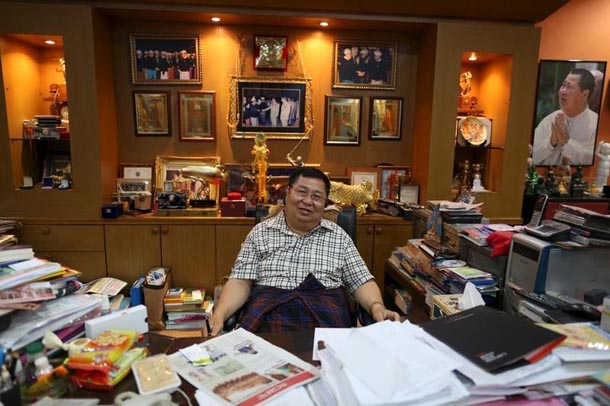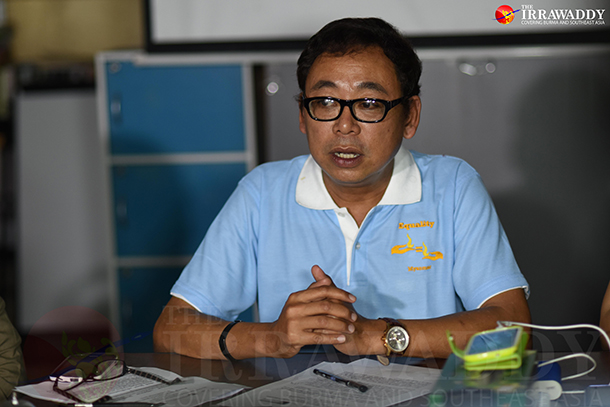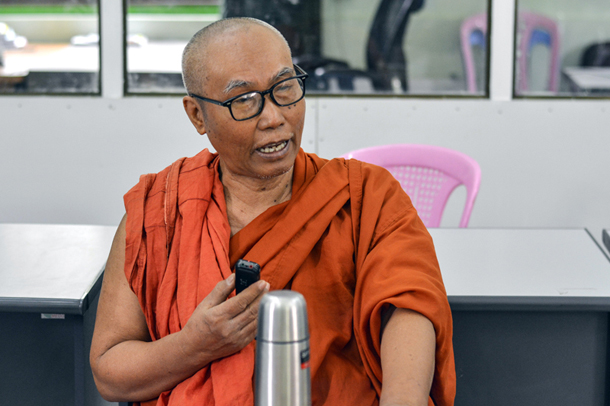The Irrawaddy asks members of civil society, the business community and the general public for their thoughts on the 21st Century Panglong Conference, starting on Wednesday in Naypyidaw, where peace negotiations with ethnic armed groups will begin in an environment of high expectations, alongside skepticism in some quarters.
Khun Bernard: general-secretary of the Union of Karenni State Youth
What do you expect from the Panglong conference?
Everyone is demanding all-inclusiveness, but the Myanmar National Democratic Alliance Army (MNDAA), the Ta’ang National Liberation Army (TNLA) and the Arakan Army (AA), alongside some other ethnic armed groups, are not invited to the conference. So, all-inclusiveness is not being realized. I don’t expect much from the conference; it will just feature discussions about the next round of negotiations.
What do you think is the most important element required for peace in the country?
The most important thing is to achieve internal peace through all-inclusive dialogue. If all stakeholders are not included, peace will not be fully achieved.
Mai Myo Aung: Ta’ang Students and Youth Organization
What do you expect from the Panglong conference?
If all [stakeholders] were included as demanded by ethnic groups, we would expect a lot. But, without the participation of all stakeholders in war zones, I don’t think they can make many decisions. So, I don’t have high expectations toward it.
What do you think is the most important element required for peace in the country?
If all ethnic armed groups in war zones were included, it would be a first step towards peace across Burma.

Khin Shwe: chairman of the Zaykabar Group of Companies
What do you expect from the Panglong conference?
Peace is important, therefore I welcome the Panglong peace conference. The places where peace still does not prevail are virgin lands and rich in unexploited natural resources.
What do you think is the most important element required for peace in the country?
The government needs to create business opportunities for the [ethnic armed] groups. Only then they will be able to make a greater contribution towards peace.
Karen and Mon states and Tenasserim Division will soon become major driving forces in the country’s economic performance. The Asian Highway is now under construction and those regions will develop by leaps and bounds after the East-West economic corridor is completed.

Aung Myo Min: human rights activist and executive director of Equality Myanmar
What do you expect from the Panglong conference?
The conference marks the start of a path to discuss age-old armed conflicts, and seek solutions. Surely, the conference won’t solve all the problems in one sitting. It will just be the starting point for adopting principles and finding ways and means to solve these problems.
What do you think is the most important element required for peace in the country?
Mutual respect is the most important thing. Our country experienced civil war and conflict because there was no mutual respect or equality. So, unless trust—based on respect—is built, it is not possible to takes steps toward a solution.
I want for the peace conference to set an example, and for presentations and discussions to be based on mutual respect and openness, to help bring about selfless devotion to national interests. At the same time, we are very concerned that [stakeholders] may present only their own problems, and the discussion will get nowhere.
Wai Hin Aung: Wan Lark Foundation, a local NGO in Arakan State
What do you expect from the Panglong conference?
I don’t expect much. We feel that the 21st Century Panglong Conference has not been an honest undertaking from the very beginning. We view it as discrimination that the government has left out three groups [AA, MNDAA, TNLA] while it has invited most other ethnic armed groups.
The coming conference does not include all ethnicities, so I have no trust in it.
What do you think is the most important element required for peace in the country?
Most of all, it is necessary that all ethnicities be included. You can’t leave out this or that group. We would talk face to face, to build mutual understanding before moving forward toward peace. Of course, that process would take time. But the government has already left out some groups. This cannot create peace, and will just intensify clashes.
Hla Maung Thein, 56: a resident of Ngazinyine Village in Kyauktaw Township of Arakan State, displaced by clashes between the Arakan Army and the Burma Army
What do you expect from the Panglong conference?
I have high expectations. I want for all ethnic armed groups to be included. Only then will the country achieve peace. Since the country is not peaceful, we have to flee from one place to another.
I heard that certain groups are not included in the peace conference. I am sorry for their absence, because peace and stability can’t be built without the inclusion of all.
What do you think is the most important element required for peace in the country?
It needs reasonable compromises from both sides. Now, both sides are sticking to their own policies and are unwilling to meet the demands of the other side. The demands made should be reasonable, and should be granted if they are reasonable.
Saw Honest: chairman of the Mae La refugee camp in Thailand
What do you expect from the Panglong conference?
Many people in the camp [located by the border with Burma] are not aware of the conference. Only politically engaged residents are interested in it. I support the conference and hope for positive results.
What do you think is the most important element required for peace in the country?
It will very much depend on our Karen leaders [in the Karen National Union, one of the armed stakeholders in the conference] and the government to reach an agreement. We have been preparing for years to return home. We hope it will help bring real peace to the country.
Naw Blooming Night Zar: spokesperson for the Karen Refugee Committee
What do you expect from the Panglong conference?
I welcome the Panglong conference. We hope it will deliver a federal democracy that grants rights to education and healthcare at the [sub-national] level. But the conference won’t result in concrete decisions because there are a lot of participants and many issues will be raised. However, it is a good start before more detailed work is undertaken in the peace process.
What do you think is the most important element required for peace in the country?
The most important thing is for a ceasefire across the country to be reached. Not only ethnic armed groups, but also the Burma Army, should cease fighting. Political dialogue should then follow. Without a nationwide ceasefire, it would be a fake or incomplete peace.

U Nayaka: abbot of the Phaung Daw Oo monastic education school in Mandalay
What do you expect from the Panglong conference?
I’m thinking, after all the positive signs we’ve seen, that Panglong could be the successful means of ending all armed conflicts in the country, even though some ethnic armed groups have been left out. I believe they will be allowed to attend future conferences, because all-inclusiveness is important for this process.
To end all conflicts and bring back peace, it is important to have dialogue, where all parties can negotiate for the sake of the country. If wars and conflicts continue, our country will never be stable. If there’s no stability, there will be no democracy.
What do you think is the most important element required for peace in the country?
The most important thing is to build back trust, which was broken a long time ago. To build back trust, the parties need to talk face to face. It will take time. If there’s no trust, peace will not be sustainable. If the parties do not let go of their egos, the conflicts will never end.

















